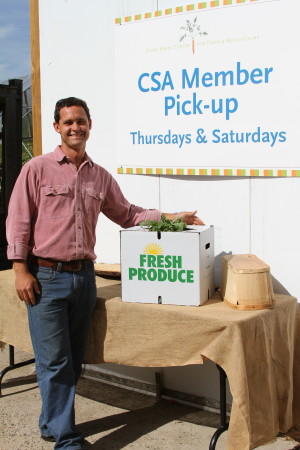What would you do if you had an acre of land and $10,000?
For Sleepy Hollow resident Deb Taft it was a no-brainer. She put it all down to start her farm, Mobius Fields, which has been operating in northern Westchester for four years. With 15 years of experience in agriculture, Taft knew that given a space to grow some crops, she could bring locally grown foods back to the county.
She noted that not many farms would exist in the county today if not for the Westchester Land Trust matching landowners with farmers.

“Most of us farmers in Westchester are necessarily small scale because land is so expensive and property taxes are so high,” Taft said.
Through this matchmaking process, farmers can connect with landowners who agree to lend a plot of their land to run a farm. For the past four years, the land trust has matched a total of 10 farmers with landowners who have agreed to donate between a half-acre and 10 acres of their property to agriculture-related businesses.
“We have a small land-linking program where we match farmers who wouldn”™t have opportunities to purchase land in Westchester County because of development pressure and because land taxes are burdensome,” said Kate Sann, preservation associate at Westchester Land Trust. “We give them an opportunity to work with landowners who have protected property. And the idea is that they run small, sustainable farms.”
Taft, who has been operating a small-scale farm in Waccabuc, gained another acre in Katonah this past year through the land trust. She newly added a community-supported component to her business, which gives her opportunities to speak with customers about the food she grows and distributes.
“Farming is making a comeback in Westchester,” Taft said. “For small-scale growers, community-supported agriculture makes a lot of sense. Westchester has a good market ”“ an educated and wealthy market ”“ so it”™s a great place to have a farm that allows people to learn more about healthy eating and buying locally grown foods.”
Community-supported agriculture, or CSA, promotes a mutually beneficial relationship: Farmers have an opportunity to receive cash flow early in the season, and customers walk away with the guarantee they can pick up a box of fresh produce every week during the harvesting months.
“A true CSA sells only the things the farmers grow,” said Erin Barnett, director of LocalHarvest, a national online resource provider for farmers. “As a customer, you buy a subscription and get the produce the farm is growing that season. As a farmer, you have to produce a succession of crops that gives you a nice full basket of a variety of things for your customers every week.”
This year, Taft is working with 12 CSA members and rotating more than 30 crops throughout the year. She said CSAs will make up 50 percent of her revenue.
Although CSA is one method of operating a farming business, most small-scale farmers in Westchester don”™t rely solely on this model to generate revenue. Often it”™s easier for farmers to produce a variety of crops they can sell at a farmers market because it alleviates the pressure of producing a certain quantity of crops each week, Taft said.
“I don”™t know any farmers who do CSAs exclusively in Westchester,” Taft said. “Seedswell in Mount Kisco does farm stands and CSAs. Hilltop Hanover in Yorktown Heights does a ”˜you pick your own”™ at the farm stands. So I think CSAs can make up a portion of your revenue, but not all of it.”
Since this is Taft”™s first year using the CSA model, she knew she didn”™t want to throw all her vegetables in one basket. She plans to regularly drop off extra produce at a farmers market in Tarrytown to sustain her business and make a living.
Other farms have been serving Westchester County for several decades and face slightly different challenges compared with small-scale farmers.
Jean-Paul Courtens and Jody Bolluyt, owners and operators of Roxbury Farm in Columbia County, run their farm solely on the CSA model and drop off their produce at five sites in Westchester including Pace University in Pleasantville, Mount Kisco Child Care Center, Full Circle Family Center in White Plains, a synagogue in Armonk and a house in Katonah.
Roxbury has been operating as a CSA since 1991. About 200 members signed up for the CSA in 1992 and by 1996 it had 650 members. Today, the farm has1,100 shareholders, about half from Westchester. Roxbury earns all of its revenue from CSAs and produces between 40 and 50 different crops year-round.
“Half a million people get vegetables through the CSA nationwide,” Courtens said. “While some CSA farms are starting up, we”™re seeing stagnation in the growth of CSA farms. They are slowing down because it”™s not for everybody. You have to be capable of growing a lot of diverse crops.”
CSA farmers also need a good business plan, seeds, a watering and fertilization system and a way to shelter the produce once they bring it out of the field, Barnett said.
“This is the time of year when a lot of people who aren”™t part of a CSA might be envious of their friends who are getting big boxes of vegetables every week,” Barnett said.
Keeping track of every farm that uses a CSA is impossible, Barnett added. But farmers who want to market their CSAs have been using the LocalHarvest website. She noted the number of web users on the site grew from 4 million in 2007 to 7 million this year.
“There are definitely a lot of young people interested in the CSA and sometimes you get entrepreneurs,” Barnett said. “Often times, they”™re primarily interested in growing food and working outside. There are a significant number of people who come in as a career change and want to get into farming.”
Farmers who operate a CSA become educators as well. At Stone Barns Center for Food and Agriculture in Pocantico Hills, the farm designates 100 shares for CSA members. Farm director Jack Algiere said when Stone Barns began in 2005, it ran a CSA on a small plot of land. Although CSAs gave customers access to locally grown produce, the model created redundancies for the center”™s existing education programs. After discontinuing the CSA for a few years, Algiere decided to bring it back this year because he valued the dialogue it created between his customers and his farmers.
“I want to get back into the CSA model because I wasn”™t getting feedback from my customers,” Algiere said. “There”™s a certain rush quality of standing in line and waiting to buy food. But with the CSA, there”™s no waiting in line or cash exchange. From our perspective, it offers a more defined voice so members can share with us what their experience is, and we can educate them on food in the process.”
Stone Barns sells its CSA shares for $700 a year, which means members receive at least $30 worth of food in their boxes each week ”“ sometimes more. Stone Barns generates one-fourth of its annual revenue through CSAs, which allows farmers to buy more seeds and plow them back into the field after Stone Barns pays its 25 staff members.
The 80-acre parcel includes 40 acres set aside for livestock, six acres for greenhouses and five acres for field crops. CSA members also can add fruits, flowers and herbs to their cart throughout the season when available as part of the CSA membership deal. Stone Barns also provides an open space for farmers who want to sell their produce every week at a local market.
“Our focus at Stone Barns is to innovate and teach,” Algiere said. “CSA is a naturalistic approach to food citizenship. It gives farmers a better sense of what customers are looking for, and it gives customers a clear agricultural view of what produce farmers grow seasonally.”
In an earlier version of this article, it said Deb Taft, owner of Mobius Farms, started her business with $50,000. The correct amount is $10,000. Also, the Westchester Land Trust matched a total of 10 land grants in the past four years – not 10 grants per year. Â




















